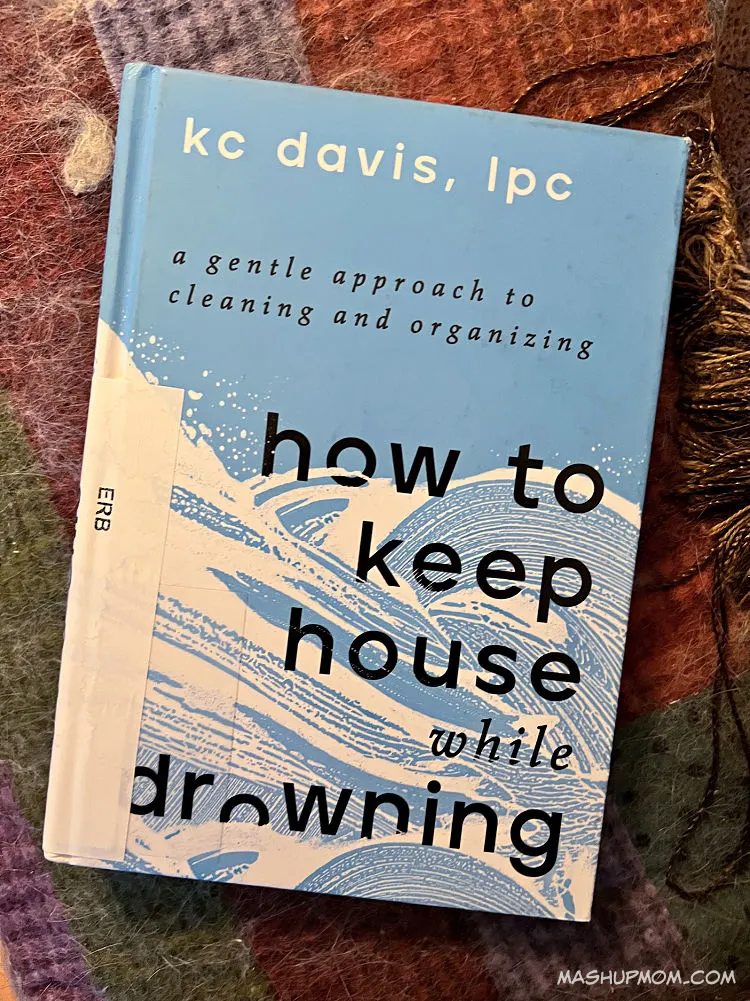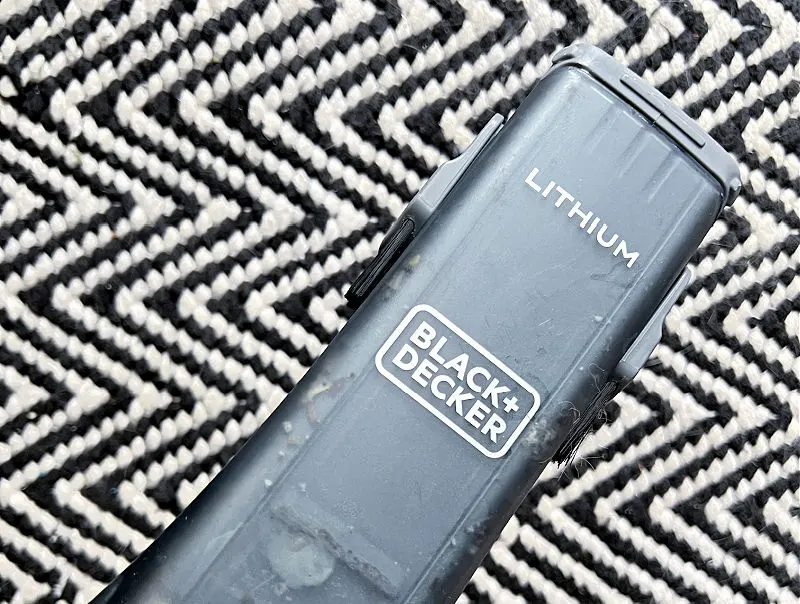How to Keep House While Drowning by KC Davis, LPC, a book review. Next up in our intermittent series: “What’s Rachel Reading?”
Check out the drifts of cat hair on my couch! I don't feel quite as bad about it, though, after reading How to Keep House While Drowning -- which has takeaways for just about anyone, no matter your own personal cleaning roadblocks and pitfalls.
Throughout the book, author and licensed professional counselor KC Davis talks (a lot) about laundry piling up and how she found her own system that works for that. Me, though, I'm all over the laundry and run it almost every day. I find it both soothing & satisfying, and there's actually a load going right now -- which I'll toss into the dryer when I need to get up, walk around, and take a break from typing. That's a system that works well for me: I both get up from the keyboard, and get a task done.
What do I definitely not find soothing? The cat hair that's somehow everywhere. And, definitely the floors. Oh, the floors... with their cat hair and litter, their mud and crumbs and leaves and water, and what even is that random smudge, and who dropped blueberries (then stepped on them) and... Laundry, I'll do that all day long. Mopping, that's another story.
How to Keep House While Drowning, a review
Most of us have been brought up to view any struggle to keep up with housework as a moral failing. What a relief, then, to read here that: Care tasks are morally neutral. Read that again: Morally. Neutral. When you can't keep on top of everything, everywhere, all at once, you're not bad, you're not lazy, and you're not a failure. Feel the weight lift, show yourself some grace, and then get on with finding the systems and priorities that work for you.
CARE TASKS ARE MORALLY NEUTRAL.
KC Davis
What's a care task, you may ask? These are life's chores, the recurring, Sisyphean, never-ending tasks that keep us and those we're responsible for going. They include things like feeding ourselves and our children, doing the laundry, cleaning the floors, and taking a shower. They're hard enough to keep up with in general, but sometimes feel insurmountable when life throws us a curveball: A baby, a divorce, an illness, a job loss...
During the beginning days of the pandemic, Davis was stuck at home alone with a newborn and toddler, her carefully plotted plan for getting the help she needed after the birth gone out the window. No preschool, no mom's group, no cleaning service, no family visits... Predictably, everything went to heck.
But, that year prompted Davis to rethink her relationship with her space and develop both strategies that worked for her, and a way of reframing care tasks that will work for many of us. Our specific strategies and priorities are less important than the way we talk to ourselves and the way that we view the functionality of our homes, and she provides both.
Shame is counterproductive
What resonated with me the most in How to Keep House While Drowning was the idea that "if you are completing care tasks from a motivation of shame, you are probably also relaxing in shame too -- because care tasks never end and you view rest as a reward for good boys and girls. So if you ever actually let yourself sit down and rest, you're thinking, 'I don't deserve to do this. There is more to do.'"
Ouch, right? This is indeed a painful way to live, and I think resonates even further for those of us who work for ourselves -- there's always something more to do there, as well. Some of you have asked why I'm pulling back from writing the ALDI meal plans (and recipes, and...) every week, and that's actually part of it. After nearly seven years of doing these, I need to consciously create more space, not only for relaxation, but for creativity and new challenges.
What I wish there were more of
Throughout her book, Davis talks about finding the strategies and timing that work for you. Maybe that's dumping laundry into bins instead of folding each piece into drawers, maybe that's only doing enough dishes tonight so that you have clean ones for breakfast tomorrow, maybe that's layering multiple layers of sheets onto the bed so that changing them on a busy day only requires stripping off the top dirty layer. (With my floors thing, I have several Dustbusters stashed throughout the house so I can easily grab one and deal with small bits at a time...)
But, what happens when you live with someone with a different style, or who has different pain points and priorities? What happens when one person smells the cat litter while the other really doesn't, or when the sight of the dishes waiting on the counter provokes insurmountable anxiety in your partner, who then either feels compelled to do those dishes... or begins to quietly resent you for not doing them? I wish Davis had spent a little more time addressing how to balance these kind of differences, because that's a reality in many relationships.
you should read this
Despite this quibble, I highly recommend picking up a copy of How to Keep House While Drowning. So much of this little book resonated with me; it's the kindest work I've ever read about cleaning and organizing, and I think there's something here for almost anyone.
You know what's kind of funny, though? Looking back, my last book review here (about a year ago) featured Good Enough, a Cookbook: Embracing the Joys of Imperfection and Practicing Self-Care in the Kitchen. Anyone detecting a theme?
And oh, what a year it's been... I'm looking back on some of the things I used to do, write, and talk about here, and we're going to go back to exploring more of those -- with some new ones in the mix. We're going to talk again about books, we're going to talk about One Thing a Day, we're going to talk about struggles with eating and cooking, and about where real food and real life collide.
You don't exist to serve your space; your space exists to serve you.
KC Davis
And yes, it all does come back around. Davis, for instance, talks about making the mental shift to see household tasks as a kindness to your future self, rather than a measure of your moral worth. This is a more beautiful way of what I was trying to say a couple of years ago with One Thing a Day. She writes that we should stop caring for our homes, which are inanimate objects in need of maintenance, not care. Instead, we should realize that we deserve to be cared for, whether our homes are immaculate or a mess -- and that our homes should care for us.
What One Thing have I finished today? Writing this book review, of course, which means that I can now return my overdue copy of How to Keep House While Drowning to the library.
More from KC Davis
@domesticblisters Its the same old thing #strugglecare #mentalhealth #divisionoflabor ♬ original sound - Kc Davis
You know what else is kind of funny? Apparently Davis has a super popular TikTok, but I don't spend much time over there and had never heard of her before picking up this little book. I did watch a few videos while writing this review, but then went right back to the book.
Why? Well, words generally work better for me, and that's kind of the point here: Finding the systems and strategies and options that work for each of us individually. What works better for you?
Maybe I'll spend just a bit more time on TikTok now that I'm consciously creating the bandwidth and space to explore and expand, but probably not. Either way, if TikTok is your own jam, check it out. If (like me) you find it easier to focus on longer form video without distracting background music, check out the TED talk video on the home page of her website.
What are you reading lately?
What have you been reading lately? Tell us about it in comments — And, you can browse all of the What’s Rachel Reading? book reviews here.


